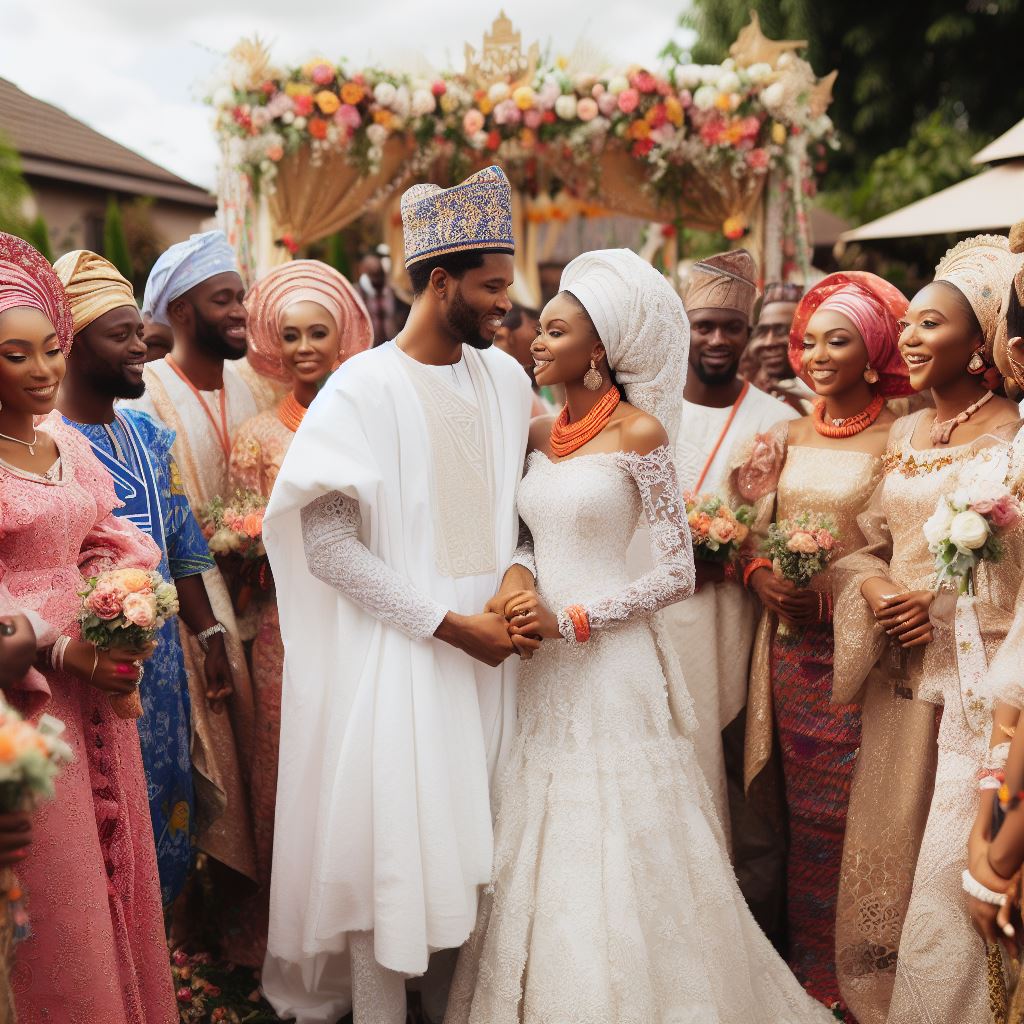Introduction
In Nigeria, the institution of marriage is a sacred and culturally significant union.
The legal aspects surrounding marriage in Nigeria are complex and multifaceted.
To appreciate the profound impact of marriage on individuals and society, it is crucial to comprehend how Nigerian law defines it.
Nigerian marriage laws govern various aspects of this union, including formation, dissolution, and the rights and responsibilities of married couples.
These laws are essential in promoting stability and justice within the Nigerian society.
Understanding the legal framework of marriage can prevent disputes and uphold individual rights.
Moreover, as a diverse nation with multiple ethnic groups and religious beliefs, Nigeria’s legal definition of marriage reflects its rich cultural tapestry.
Nigerians must understand regional marriage customs and laws, ensuring awareness of legal rights and obligations in this lifelong commitment.
This blog series aims to delve deeper into the legal aspects of marriage in Nigeria, shedding light on topics like the types of marriages recognized by Nigerian law, the marriage registration process, and the legal rights and duties of spouses.
By the end of this series, you will have a comprehensive understanding of how Nigerian law defines marriage and how it impacts individuals and society.
Read: A Lifelong Bond: Inspirational Bible Verses on Marriage
Overview of Nigerian law on marriage
Nigerian law recognizes various types of marriages, each with its own legal requirements and implications.
Legal recognition of marriages is vital for the protection and regulation of marital relationships in Nigeria.
Types of Marriages Recognized under Nigerian Law
- Statutory marriage: These marriages are governed by the Marriage Act and require formal registration.
- Customary marriage: This type of marriage is based on traditional practices and recognized by customary law.
- Islamic marriage: Islamic marriages are conducted in accordance with Islamic rites and regulated by Islamic law.
- Traditional marriage: Local customs and traditions recognize these marriages, with variations among different ethnic groups.
- Same-sex marriage: Currently, Nigerian law does not recognize same-sex marriages.
The legal recognition of these different types of marriages is essential in providing protection and rights to couples.
Importance of Legal Recognition for Marital Relationships
- Property and inheritance rights: Legal recognition ensures that spouses have legal claims to property rights and inheritance. This protects their interests in case of divorce or death.
- Spousal support and maintenance: Marital relationships recognized by law grant spouses the right to seek financial support and maintenance in the event of separation or divorce.
- Custody and guardianship: Legal recognition establishes the rights and responsibilities of parents over their children, including custody and guardianship.
- Societal acceptance and legitimacy: The law recognizes marriages, and society accepts them, granting couples validation and social recognition.
- Access to benefits and privileges: Legal recognition ensures access to various benefits and privileges, such as healthcare, social security, and immigration rights.
- Protection against domestic violence and abuse: Being in legally recognized marriages equips individuals with the necessary legal recourse and protection against domestic violence or abuse.
- Dissolution and divorce: Legal recognition outlines the legal procedures and requirements for the dissolution of marriages, ensuring fairness and protection of the parties involved.
- International recognition: Nigerian law recognizes marriages, making them more likely to gain acknowledgment and respect across borders.
- Legal certainty and predictability: Legal recognition provides clarity and certainty to marital relationships, preventing disputes and confusion regarding rights and obligations.
- Access to marriage registration: Legal recognition enables couples to register their marriages, ensuring their union is officially recorded and documented.
Basically, Nigerian law recognizes various types of marriages, each with its own significance and legal implications.
Legal recognition of marriages is crucial in protecting the rights and interests of couples, ensuring societal acceptance, and providing access to benefits and privileges.
It is essential for individuals to understand the legal requirements and consequences of different types of marriages to ensure compliance and safeguard their rights.
Read: God’s Plan for Marriage: Rooted in Biblical Scriptures
Types of Recognized Marriages in Nigeria
In Nigeria, marriage takes on various forms, each with its unique cultural and legal attributes.
In Nigeria, there are various types of marriages that are recognized by the law.
These include traditional/customary marriages, statutory marriages, Muslim marriages, and civil marriages.
Each type has its own set of legal requirements and processes.
Let’s delve into the key marriage types:
Traditional/Customary Marriages
- Cultural Significance: These marriages uphold cultural heritage and family traditions.
- Legal Requirements: Register with the Local Government Council; no age limit.
- Rights & Responsibilities: Mutual support, inheritance rights, and child custody.
Statutory Marriages
- Different from Customary: Governed by the Marriage Act, distinct from traditional customs.
- Legal Procedures: File notice at a marriage registry, obtain a certificate.
- Pros and Cons: Legal recognition, property rights, but may involve bureaucracy.
Muslim Marriages
- Legal Aspects: Governed by Islamic law, sharia courts handle disputes.
- Registration Process: Consent, two witnesses, and registration at the mosque.
- Requirements: Mutual consent, mahr (dower), and adherence to Islamic customs.
Civil Marriages
- Distinct Nature: Secular, non-religious unions recognized under the Marriage Act.
- Legal Process: File notice at a marriage registry, obtain a marriage certificate.
- Advantages & Challenges: Legal protection, inheritance, but may lack cultural significance.
These diverse marriage types reflect Nigeria’s rich cultural tapestry.
Knowing the legal intricacies and cultural significance of each type is essential for couples planning to tie the knot in this diverse and vibrant nation.
Traditional/Customary Marriages
Traditional/customary marriages hold immense cultural significance in Nigeria.
They are deeply rooted in customs and traditions that have been passed down through generations.
These marriages reflect the cultural diversity of the Nigerian people and are an integral part of their identity.
To register a customary marriage, couples must fulfill certain legal requirements and follow specific processes outlined by their respective communities.
This includes obtaining the consent of both families, exchanging of marital rights and obligations, and performing traditional rites and ceremonies.
Spouses in a customary marriage have certain rights and responsibilities.
These include the obligation of fidelity, the duty to support and care for each other, and the right to inherit property according to customary law.
It is important to note that these rights and responsibilities may vary depending on the specific customs and traditions of the community.
Statutory Marriages
Statutory marriages, on the other hand, are governed by Nigerian law.
These marriages are conducted and recognized by civil authorities.
They differ from customary marriages in that they are not based on specific traditions or customs but rather on legal provisions.
In order to enter into a statutory marriage, couples must meet certain legal requirements, such as age and mental capacity, and go through prescribed procedures.
This includes obtaining a marriage license from the appropriate government agency, conducting a civil ceremony, and registering the marriage with the relevant authorities.
Statutory marriages offer advantages such as legal recognition and protection, including the right to property ownership, inheritance, and access to certain benefits and privileges provided by the law.
Obtaining the necessary documents incurs high costs, and one must adhere to strict regulations, posing disadvantages.
Muslim marriages
Muslim marriages in Nigeria have their own legal aspects that are governed by Islamic law.
Islamic law plays a significant role in regulating and overseeing Muslim marriages in the country.
To register a Muslim marriage, couples must comply with specific requirements and processes outlined by Islamic authorities.
This may include obtaining the consent of the bride and the presence of witnesses during the marriage ceremony.
While Islamic law governs the personal status and rights of Muslims, civil registration is also required for legal recognition.
Civil marriages
Civil marriages, unlike customary or Muslim marriages, are conducted and recognized by civil authorities.
These marriages are based on the legal provisions of the country and do not have specific cultural or religious requirements.
To enter into a civil marriage, couples must fulfill legal requirements such as age, consent, and mental capacity.
They must also go through official procedures, including obtaining a marriage license and signing the marriage certificate in the presence of a civil registrar.
Civil marriages offer benefits such as legal protection, equal rights, and access to social and financial entitlements provided by the state.
However, challenges may arise due to strict regulations and requirements, including the need for witnesses and the involvement of government agencies.
Generally, Nigeria recognizes various types of marriages, each with its own legal aspects.
Traditional/customary marriages, statutory marriages,
Muslim marriages, and civil marriages all have different processes and requirements.
Couples must grasp these legal intricacies to secure legal recognition and safeguard their marriages.
Read: The Role of Husbands & Wives: Exploring Ephesians 5

Delve into the Subject: The Influence of Religion on Marriage Life in Nigeria
Effects of Legal Marriage Recognition
Rights and Benefits of Legal Marriage in Nigeria
Legal marriage recognition in Nigeria brings several rights and benefits for couples. These include:
- Legal Protection: Being legally married provides a strong legal foundation for the relationship, ensuring the rights and interests of both spouses are protected.
- Financial Benefits: Legal marriage allows couples to enjoy financial benefits, such as joint property ownership, joint tax filing, and access to social security benefits.
- Inheritance Rights: Spouses in a legal marriage have automatic inheritance rights, ensuring that they can inherit their partner’s property and assets seamlessly.
- Health Insurance: Many health insurance policies in Nigeria offer coverage to legally married couples, providing access to healthcare benefits and financial security in case of medical emergencies.
- Parental Rights and Custody: Legal marriage recognition determines the custody of children in case of separation or divorce, ensuring that both parents have rights and responsibilities towards their children.
Impact on Custody, Inheritance, and Property Rights
Legal marriage recognition significantly affects various issues related to custody, inheritance, and property rights in Nigeria:
- Custody: In case of divorce or separation, legally married couples have a structured legal process to determine custody arrangements for their children, prioritizing the best interests of the child.
- Inheritance: Legal marriage ensures that the surviving spouse has the right to inherit the deceased partner’s assets, preventing any disputes or challenges to the inheritance.
- Property Rights: Legal marriage grants spouses equal property rights, allowing them to jointly decide and share ownership of assets.
- Financial Security: Legal recognition of marriage secures spouses financially, guaranteeing their entitlement to support and assets in divorce or dissolution.
- Protection of Vulnerable Spouses: Legal recognition of marriage safeguards the rights of vulnerable spouses, particularly in cases of domestic violence or abuse, by allowing them to seek legal protection and support.
Importance of Legal Protection in Divorce or Dissolution
Legal protection plays a crucial role in cases of divorce or dissolution of marriage in Nigeria:
- Asset Division: Legal marriage recognition ensures that assets are divided fairly between spouses, preventing any unfair advantage or exploitation.
- Alimony and Spousal Support: Legal recognition enables the provision of spousal support or alimony in cases where one partner is financially dependent on the other.
- Child Support: Through legal channels, divorced or separated couples can arrange child support payments, ensuring the well-being and proper upbringing of their children.
- Dispute Resolution: Legal protection offers a framework for resolving disputes during the divorce process, facilitating a fair and just resolution for both parties involved.
- Mental and Emotional Well-being: The legal systems provide processes for counseling or mediation, facilitating emotional support for spouses during the difficult period of divorce or dissolution.
Legal marriage recognition in Nigeria grants couples financial security, inheritance rights, and safeguards vulnerable spouses.
It also plays a pivotal role in issues like custody, inheritance, property rights, and the overall legal protection of spouses.
Couples must grasp and accept marriage’s legal facets to protect their rights and interests during their marital journey.
Read: Navigating Marital Challenges: Guidance from the Bible
Conclusion
We’ve delved into how Nigerian law defines marriage. It’s crucial to grasp these legal intricacies.
Understanding them ensures couples’ rights and protections.
Marriage, in Nigeria, is primarily governed by the Marriage Act of 1914.
It sets the legal framework, including age requirements and consent.
Customary and Islamic marriages also hold legal weight if properly registered.
This recognition safeguards the rights and interests of parties involved.
Property and inheritance rights are intricately tied to marriage definitions.
Knowing these rules can save couples from potential disputes.
Importantly, in cases of dissolution, the law outlines the proper procedures for divorce or annulment.
This knowledge can expedite the process and protect the interests of both spouses.
However, with the complexities of Nigerian marriage law, seeking legal advice is highly recommended.
This professional guidance can clarify doubts and ensure full compliance.
In a country with diverse cultures and religious practices, understanding how Nigerian law defines marriage is fundamental.
It ensures that love is protected by the law. If you have questions or concerns, don’t hesitate to consult with a legal expert.
Your marital journey deserves this legal security.




